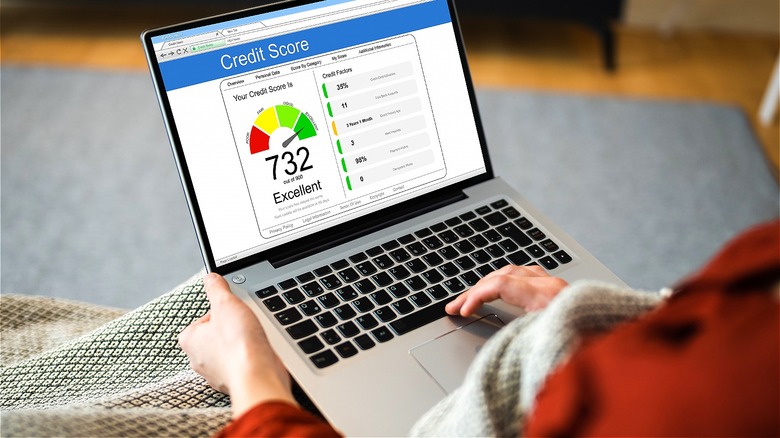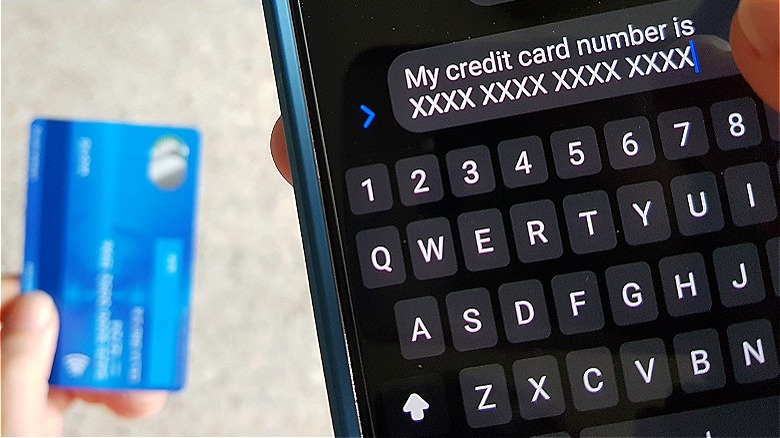This Is How Often You Should Really Be Checking Your Credit Score
There is a long-held belief that checking your credit score will cause your score to drop, and this often leads people to avoid checking their credit score altogether. However, not only is this belief not entirely true (the soft credit checks you'd likely use through an app to monitor your score don't negatively impact it) but it can also lead to downright negative financial consequences. Regularly checking your credit score is not only the best way to monitor your financials and potentially find areas for improvement, but it can also be crucial in discovering any potential identity theft and fraud before it's too late.
Financial institutions have made it easier than ever to keep track of your credit score by including credit reporting on many banking apps. Bundling your financial information in a single place can make it easier to check everything at once, while also ensuring you're more likely to actually keep track of your credit score. According to a 2012 study by the Federal Trade Commission, one in five Americans had an error on their credit reports, with 5% finding errors that negatively impacted their scores (causing increased prices on loans and insurance).
While disputing credit report information isn't exactly a fun or easy process, correcting inaccuracies can and will make a huge difference to your overall creditworthiness. Improving your credit can have long-term financial benefits, as well as added peace of mind, and this can all be as easy as checking your credit score regularly.
The impact of checking your credit regularly
The most important thing to remember is that there are two kinds of credit checks: hard and soft. Hard credit checks are the kind typically used by banks, utilities, credit card issuers, cell phone providers, and even rental companies to get a full assessment of your existing credit. Since a third party is pulling your credit, this counts as a hard pull and it does affect your credit score. The good news is that (most of the time) hard pulls will only affect your credit score between one and five points. Plus, hard pulls will only negatively affect your score for one year and the inquiry only appears on your credit report for two years. In all, they have a minimal impact for a short period of time.
Soft pulls, on the other hand, have no impact on your credit score at all. These pulls, which can typically be done for free through your bank or even a financial app of your choosing, allow you to get a snapshot of your credit without negatively impacting your score. Soft pulls are extremely helpful for monitoring your overall credit history. Plus, they also allow you to watch, in real time, how you might be improving or hurting your credit score through your financial behaviors. It's also worth mentioning that some lenders even utilize soft pulls on your credit instead of the more extreme hard pull, and while these inquiries might show up on your credit report, they will not impact your score.
Things to look out for in a credit report
Not checking your credit report and score is one of the most common financial mistakes out there, so remember you're not alone. While checking your credit score regularly is extremely beneficial, it's also important to take a closer look at the different factors affecting your score. While, yes, the overall score is a key takeaway, you can learn a lot about your credit (and even ways to improve it) by taking a closer look at the categories on your credit report. Specifically, your credit utilization ratio can be an important element to keep tabs on. This ratio calculates the amount of credit available to you and compares it to how much of your credit you've already spent. Banks and lenders prefer to see a ratio that is kept under 30%, but even having a ratio in the 20% range can affect your credit score.
It's also important to double-check your hard credit inquiries and to make sure there aren't new lines of credit that have been instigated or issued without your knowledge. If you find that categories have changed without your involvement, you might be dealing with identity theft. Make sure to contact your credit card issuer, the credit bureaus, and even potentially law enforcement depending on the level of fraud. Credit card issuers must receive notice of suspected fraudulent charges within 60 days of your statement date, so it's also important to keep a close eye on your card statements to make sure they're correct.


